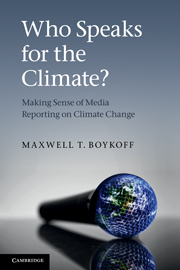2 - Roots and culture
Exploring media coverage of climate change through history
Published online by Cambridge University Press: 05 June 2012
Summary
People make their own history, but they do not make it just as they please; they do not make it under circumstances chosen by themselves, but under circumstances directly encountered, given and transmitted from the past. The tradition of all the dead generations weighs like a nightmare on the brain of the living
Marx, 1891, The Eighteenth Brumaire of Louis Bonaparte, 15Today’s media representations are manifestations of past themes, resonant tropes and collective institutional as well as individual memories. By examining current media narratives, we can delve into histories of scientific and policy endeavours that have sought to understand as well as govern climate processes and effects. Through such undertakings taken up in this chapter, we can identify and ponder moments of critical discourse that have shaped ongoing climate storylines.
Scientific pursuits to make sense of climate change have a long and rich history; however, a historical look at how climate has been communicated through mass media is comparably shorter and much less developed. In Annals of the Former World, writer John McPhee provided the analogy that the 4.6 billion-year history of time on Earth can be considered as distance from fingertip to fingertip with one’s arms spread wide. He wrote, ‘the Cambrian begins at the wrist … all of the Cenozoic is in a fingerprint, and in a single stroke with a medium-grained nail file you could eradicate human history’ (McPhee, 1998). Considered in this way, it would merely take a fine-grained nail file to remove the history of science communications and mass media. In fact, before the late 1980s, media portrayals of ‘climate change’ or ‘global warming’ were sporadic, compared to the amount of coverage in most regions around the world today (see Figure 2.1).
- Type
- Chapter
- Information
- Who Speaks for the Climate?Making Sense of Media Reporting on Climate Change, pp. 30 - 52Publisher: Cambridge University PressPrint publication year: 2011



